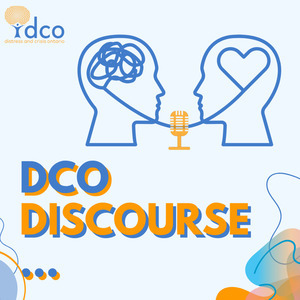Episode 23
How to Talk About Eating Disorders
May 23rd, 2019
28 mins 18 secs
Season 1
Your Hosts
Tags
About this Episode
Statistics indicate that approximately 1% to 4.2% of women have suffered from anorexia in their lifetime, and eating disorders have the highest fatality rate of any mental illness. Eating disorders may or may not be the first reason a crisis/distress line caller is reaching out, but eating disordered behaviours might be disclosed as a significant part of the problem. Callers may express their challenges with depression, anxiety, substance usage or even relationship problems but not initially disclose they are living with an eating disorder. This could be because of shame or because they might not recognize the impact their eating is having on their mood, or that their mood is having on their eating. Call responders may have to keenly listen for cues which might indicate a connection between the caller’s high focus on weight and shape and their self-worth, or with further discussion, the caller may reveal that they have food rules which they strictly adhere to, that they severely restrict their food, or that they have binge eating or purging behaviours. In the following vignette, Lauren Dixon, therapist in the Eating Disorders and Addiction Clinic at the Centre for Addiction and Mental Health (CAMH) in Toronto, will present a very enlightening and informative session on this challenging and life impacting disorder. Ms. Dixon details and describes varying types of eating disorders, the prevalence and risk factors involved in developing the condition; and offers helpful and supportive strategies for crisis/distress line responders. Questions for Further Consideration: You or someone you know has struggled in the past with an eating disorder. How do you, as a crisis/distress line responder, handle calls from an individual who is describing symptoms similar to yours who is questioning if she has an eating disorder? Many people have personal biases, beliefs and experiences with problematic eating behaviours and eating disorders which might seep into communications with callers; plus, it is often challenging when a caller expresses any concerns which are similar to your own. Remember the call is not about you or your friend but about the person at the end of the line. You are there to offer an empathetic, supportive and listening ear. Reinforce the caller with praise for reaching out about these issues, and encourage her to explore her questions further with a physician or other trusted support. You can also make recommendations of eating disorders resources in your community. If you find that this call has unsettling effects on your emotions, it might be a good idea to speak to a counselor or find someone who might be able to de-brief with you. A parent of a teen calls telling you that her child is not over or underweight but she has found evidence of secretive eating, like empty ice-cream containers and several empty boxes of cookies in her daughter’s closet. She asks you what you think is going on – what do you say? Validate the parent’s concern, finding hidden evidence of potential binge eating is understandably worrying for this mother. While you might suspect that the daughter is showing signs of bulimia remember you are not a physician and should not be diagnosing her family member. You might recommend she speak to her health professional and refer her to some websites or community supports so that she may seek further advice or diagnosis. Ms. Dixon reports there are a number of recommended treatments for eating disorders. Do you know what resources are in your community? Larger urban communities may have more readily available treatment centres for eating disorders. If you are from a smaller community, it might be helpful to explore with your training coordinator where some of your closest treatment centres might be. Make sure to have these resources readily available for easy access should such a request be put forth by a caller. Additionally, having the individual contact their physician is a good starting point. Glossary: Anorexia Nervosa (AN): having an obsession with controlling one’s eating and weight. The reason for their obsession can be a belief that by controlling their bodies they can control their lives. This obsession is usually directed at eating as little as possible. People with anorexia nervosa might binge eat and purge, but their weight is below the normal weight range for their height, age and gender. Bulimia Nervosa (BN): is characterized by cycles of binge eating and purging. This behaviour is often driven by a desire to regulate emotions, and with worries about body weight and shape. Binge eating is also often prompted by not eating enough food in other parts of the day. People with bulimia nervosa are within the normal weight range for their height, age and gender. Binge Eating Disorder (BED): Eating excessive amounts of food at one time. This might happen because they have been dieting or restricted their eating in some way – so it is a response to hunger. Or they over-eat to comfort themselves, to avoid uncomfortable situations, or to numb their feelings – an attempt to soothe themselves emotionally. Eating Disorders Not Otherwise Specified (ED-NOS): experiencing a mix of anorexia and/or binge eating symptoms, but do not fall neatly into one of the medical categories. (nedic.ca)
